Nowadays, a credit card isn’t just a payment tool, it’s a lifestyle enabler. Whether you’re booking flights, paying for groceries, or managing business expenses, the right credit card can simplify your financial journey. Among countless issuers, Chase Credit Card stands out for its reliability, flexibility, and rich rewards.

For millions of Americans, Chase offers more than just convenience. It presents solutions tailored to your spending habits, credit profile, and long-term financial goals. So, this post explores everything you need to know about Chase Credit Card products and why they could be your smartest financial tool in 2025.
Introduction to JPMorgan Chase Bank
JPMorgan Chase Bank is one of the most prominent and trusted financial institutions in the United States. It offers a comprehensive suite of services for personal, business, and investment banking needs. As the consumer and commercial banking division of JPMorgan Chase & Co., Chase serves millions of individuals, families, and businesses. Due to its extensive branch network and intuitive online and mobile banking platforms, Chase has earned a reputation as a reliable financial partner.
History of JPMorgan Chase Bank
The origins of JPMorgan Chase date back to the late 18th and 19th centuries. It is rooted in the legacy of several influential financial entities such as The Manhattan Company, J.P. Morgan & Co., and Chase National Bank. These institutions played pivotal roles in shaping the American economy, financing major industries like railroads, steel, and infrastructure.
The modern-day bank emerged through a series of transformative mergers. In 2000, Chase Manhattan Bank merged with J.P. Morgan & Co., forming JPMorgan Chase & Co. Subsequent acquisitions, including Bank One in 2004 and Washington Mutual in 2008, further expanded its reach and influence in the consumer banking market.
Today, JPMorgan Chase is regarded as one of the “Big Four” banks in the United States and ranks among the largest global financial institutions, managing over $3 trillion in assets. Generally, the bank successfully blends a rich historical legacy with state-of-the-art technology and an unwavering commitment to customer service.
General Services of Chase Bank
Chase offers diverse financial services tailored to meet the needs of individuals, businesses, and institutions. These services include:
- Personal Banking: Checking and savings accounts, debit cards, mobile and online banking tools, and access to one of the largest ATM and branch networks nationwide.
- Credit Cards: Personal and business credit cards, offering benefits such as cash back, travel rewards, low-interest balance transfer, and so on.
- Home Lending: A variety of mortgage solutions such as conventional loans, FHA, VA, jumbo loans, refinancing options, and programs for first-time homebuyers.
- Auto Loans: Convenient auto financing and refinancing with competitive rates, a digital application process, and helpful payment management tools.
- Business Banking: Solutions for small businesses to large corporations, including business checking accounts, lines of credit, merchant services, loans, and integrated tools.
- Investing & Wealth Management: Through J.P. Morgan Wealth Management, access self-directed investing, robo-advisory portfolios, and personalized guidance from licensed financial advisors.
- Student & Credit Solutions: Support students with beginner-friendly checking accounts and credit cards.

Chase Bank is famous for its nationwide accessibility, highly rated mobile experience, and customer-focused service. So this makes it a top choice for anyone seeking dependable, transparent, and innovative financial solutions.
Types of Chase Credit Cards
As one of the most widely recognized credit card providers in the U.S., Chase offers a comprehensive portfolio that addresses a wide range of consumer and business needs. In this section, we’ll explore popular Chase Credit Cards and what makes them a preferred choice among American cardholders.
What is a Chase Credit Card?
A Chase Credit Card is a financial tool issued by JPMorgan Chase Bank that allows individuals and businesses to borrow funds up to a set credit limit. It functions on a revolving credit basis, meaning users can carry a balance month to month (with interest) or pay in full to avoid interest altogether.
Unlike debit cards, which deduct money directly from your bank account, Chase credit cards give you flexibility:
- You can make purchases now and pay later
- Earn valuable rewards on everyday spending
- Build or improve your credit history over time
- Access exclusive perks, such as travel protections, cashback offers, and purchase insurance
Every Chase Credit Card is backed by robust fraud monitoring, real-time alerts, mobile app controls, and zero-liability protection for unauthorized transactions. So it offers both convenience and security.
Chase Cash Back Credit Card
Cash back cards are a favorite for individuals who want to earn rewards on their everyday spending. These cards return a percentage of purchases as cash, typically applied as statement credits or direct deposits. Chase’s cash back lineup focuses on simplicity, flexibility, and no annual fees.
1. Chase Freedom Unlimited
This card is ideal for users who want consistent rewards without managing categories. It offers a flat rate on all spending while giving extra value for dining, drugstores, and travel via Chase.
Key benefits:
- Unlimited 1.5% cash back on all purchases
- 3% back on dining, including takeout and eligible delivery
- 3% back on drugstore purchases
- 5% back on travel booked through Chase Ultimate Rewards
- $200 bonus after spending $500 in the first 3 months
- $0 annual fee, making it great for budget-conscious users
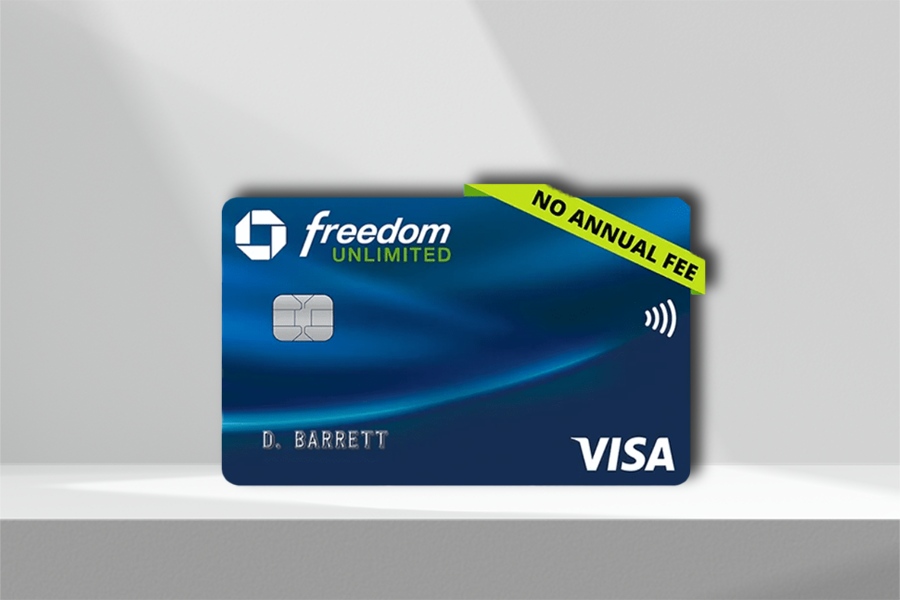
2. Chase Freedom Flex
A more dynamic choice, Freedom Flex provides higher rewards in rotating categories. It’s great for shoppers who are willing to plan their purchases to maximize quarterly offers.
Key benefits:
- 5% cash back on rotating bonus categories (up to $1,500 per quarter)
- 5% back on Chase Travel purchases
- 3% back on dining and drugstores
- 1% back on all other purchases
- Includes cell phone protection when paying your bill with the card
- $0 annual fee, ideal for maximizing value
Chase Travel Rewards Credit Card
For frequent travelers, Chase’s travel rewards cards offer substantial value. These cards earn points that can be redeemed through Chase Ultimate Rewards, often at elevated rates for travel bookings. Moreover, these cards come with premium benefits like insurance, credits, and lounge access.
1. Chase Sapphire Preferred
A top-tier travel card with a manageable annual fee, Sapphire Preferred is well-suited for individuals who want to travel smart without paying for luxury perks they won’t use.
Key benefits:
- 5x points on travel purchased through Chase Travel
- 3x points on dining, including delivery and takeout
- 2x points on other travel expenses
- 1x points on all other purchases
- 60,000-point bonus after spending $4,000 in 3 months (worth $750 via Chase)
- Trip cancellation/interruption insurance, baggage delay coverage, and purchase protection
- Annual fee of $95, offering excellent value for travelers
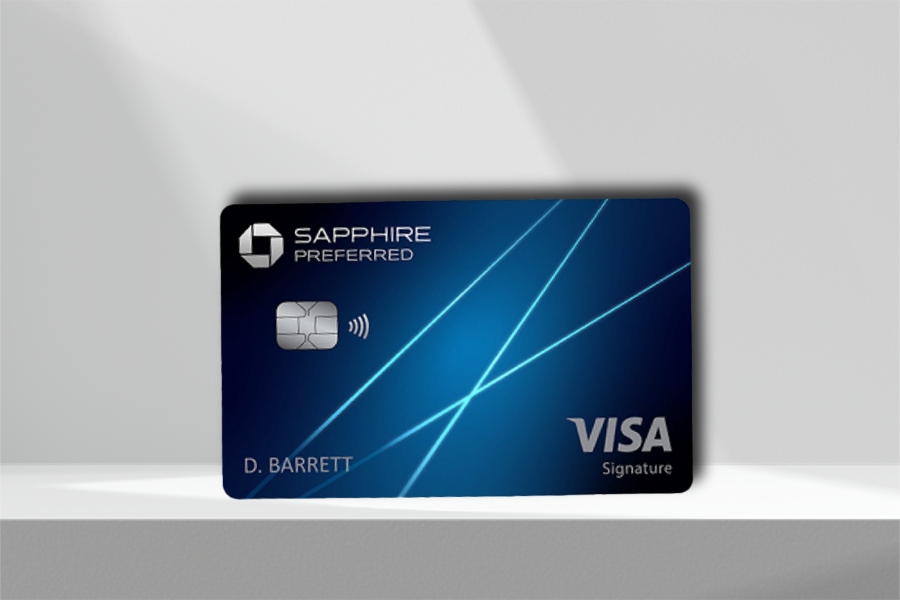
2. Chase Sapphire Reserve
This premium card is ideal for high-frequency travelers who want luxury benefits like airport lounge access, elevated redemption values, and robust protections.
Key benefits:
- 3x points on travel and dining
- 10x points on Chase Dining, 5x on flights, 10x on hotels and car rentals via Chase Travel
- 1x points on other purchases
- 60,000-point bonus after $4,000 spend (worth $900 via Chase Travel)
- $300 annual travel credit to offset costs
- Global Entry/TSA PreCheck reimbursement, Priority Pass lounge access, and 50% more value on point redemptions through Chase
- $550 annual fee, offset by premium perks for frequent flyers
Chase Business Credit Card
Chase’s business credit cards are designed to streamline operations, simplify accounting, and reward spending on common business categories. Whether you run a freelance operation or manage a larger team, these cards offer flexibility and rich returns.
1. Ink Business Unlimited Credit Card
For business owners who want uncomplicated, flat-rate rewards, Ink Business Unlimited delivers consistent cash back on all spending without category restrictions.
Key benefits:
- Unlimited 1.5% cash back on every business purchase
- $750 welcome bonus after spending $6,000 in the first 3 months
- No annual fee, excellent for growing businesses
- Free employee cards, spending controls, and budget tracking
- Easily integrates with bookkeeping and accounting tools
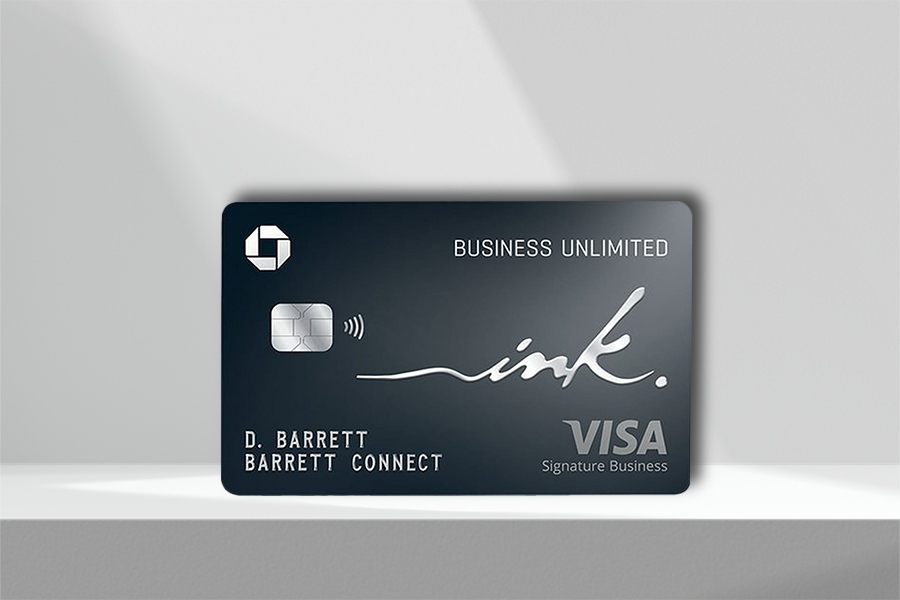
2. Ink Business Preferred Credit Card
This card suits businesses with significant spend on travel, digital advertising, and shipping. It rewards key growth areas and comes with one of the highest signup bonuses on the market.
Key benefits:
- 3x points on up to $150,000 spent annually on travel, shipping, internet/phone services, and digital advertising
- 1x points on all other purchases
- 100,000-point bonus after spending $8,000 in the first 3 months (worth $1,250 in travel)
- Employee card customization and advanced spending controls
- Built-in purchase and travel protection, including extended warranty
- $95 annual fee, offset by high returns in business categories
Other Specialized Credit Cards
Though not as commonly advertised, Chase also offers co-branded credit cards with airlines, hotel chains, and retail partners. Such as: Southwest Rapid Rewards, United MileagePlus, Marriott Bonvoy, and Amazon Prime Rewards. These cards often include:
- Airline perks: Free checked bags, priority boarding
- Hotel benefits: Free nights, status upgrades
- Retail bonuses: Extra cash back or discounts for cardholders
These are ideal for loyal customers of specific brands who want to maximize their spending in targeted categories.
| Card Name | Rewards | Bonus Offer | Annual Fee |
| Freedom Unlimited | 1.5% cash back | $200 after $500 spent in 3 months | $0 |
| Freedom Flex | 5% rotating categories | $200 after $500 spent in 3 months | $0 |
| Sapphire Preferred | 5x on Chase Travel | 60,000 points = $750 travel value | $95 |
| Sapphire Reserve | 3x on travel & dining | Premium perks + lounge access | $550 |
| Ink Business Unlimited | 1.5% on business spend | $750 after $6,000 spent | $0 |
| Ink Business Preferred | 3x on travel & ads | 100,000 points after $8,000 spend | $95 |
Why choose a Chase Credit Card?
There are several reasons why Chase Credit Card products are among the most popular in the U.S:
- Wide selection: Either a beginner, a seasoned traveler, or entrepreneurs, there’s a card for everyone.
- Flexible rewards: Points can be redeemed for travel, gift cards, statement credits, or even Apple products via Chase Ultimate Rewards.
- Robust protections: Includes purchase protection, extended warranties, travel insurance, and fraud monitoring.
- Strong mobile experience: Chase’s mobile app makes it easy to track spending, redeem points, and manage card settings in real time.
- Generous signup bonuses: Many cards offer bonuses worth $200 to $1,250 for new users who meet the initial spending requirement.
Chase Credit Card: Eligibility Criteria
Before applying for a Chase Credit Card, it’s important to understand the criteria that determine whether you’re likely to be approved. Chase considers both general eligibility and internal policies that can affect your application outcome.
Eligibility for People
These are the basic personal requirements every applicant must meet. Fulfilling these ensures you’re legally and financially qualified to hold a credit card with Chase.
- Age requirement: You must be at least 18 years old to apply.
- Residency status: Applicants must live in the United States or be permanent residents with valid documentation.
- Social Security Number: A valid SSN or ITIN is needed to verify identity and check credit history.
- Income requirement: You must have a stable and verifiable source of income to demonstrate your ability to repay debts.
- Credit score expectations:
- 700+ is usually required for premium cards like the Chase Sapphire Reserve.
- 600 – 700 may be acceptable for standard cash back or starter cards like Freedom Unlimited or Freedom Rise.
Other Considerations
In addition to the basic requirements, Chase uses internal policies and risk assessments to make final decisions. Understanding these factors can help you plan better.
- 5/24 Rule: If you’ve opened five or more credit cards (from any bank) in the past 24 months, Chase is likely to reject your application.
- Banking relationship: Having a Chase checking or savings account may boost your chances, especially if you’re applying for beginner-friendly cards.
- Credit history depth: A thin or limited credit history may restrict you to entry-level cards like Freedom Rise until your profile matures.
- Debt-to-income ratio: While not publicly disclosed, Chase evaluates your existing debts versus income, especially for higher-limit or premium cards.

New to credit or rebuilding? Consider starting with Chase Freedom Rise or explore personal loan products to establish a credit history before applying for higher-tier cards.
Chase Credit Card: Documents and Procedures
Understanding required documents and how to apply can help you avoid delays and maximize your chances of approval for a Chase Credit Card. Below is a breakdown of the essentials, including the application process and where to begin.
Required Documents for a Chase Credit Card
These are the standard documents you should prepare before starting your application. Having them ready can speed up the process and reduce the chances of errors or rejections.
- Government-issued ID: A valid driver’s license, state ID, or passport is required to confirm your identity.
- Social Security Number (SSN): Chase uses your SSN or ITIN to pull your credit report and verify your financial background.
- Proof of income: Submit recent pay stubs, tax returns, or bank statements that reflect your income. This helps Chase assess your ability to repay.
- Employer or business information: For business card applications, you’ll need your company name, business structure, EIN, and sometimes documents like a business license.
- Bank account information (optional): While not mandatory, having an active Chase checking or savings account may improve your approval odds, especially for starter cards.
Application Procedures
Chase offers multiple ways to apply, all of which are convenient and secure. Choose the method that works best for your situation.
- Online portal: Visit the Chase official website to browse and apply for any Chase Credit Card directly.
- In-person application: You can apply at any Chase branch, where a banker can assist and answer questions.
- Pre-qualification tool: Use Chase’s pre-approval checker online to see if you’re likely to qualify, without impacting your credit score.
- Phone application: Call Chase customer support to apply by phone, especially helpful for business owners or those needing guidance.
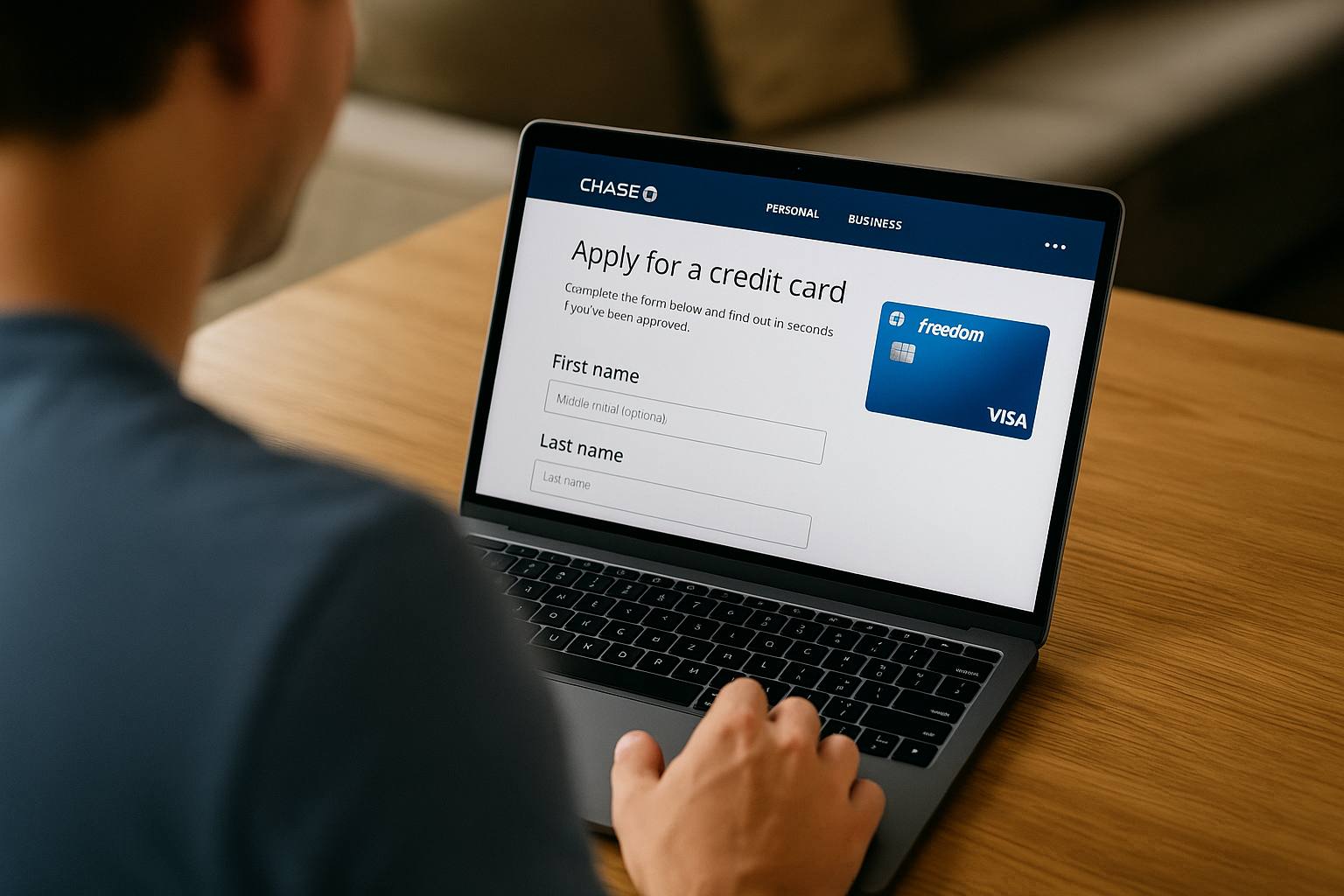
Need quick access to funding while you wait for your new credit card? Consider exploring auto refinance or personal loan services for faster liquidity options.
Chase Credit Card: Terms and Rates
When applying for a Chase Credit Card, it’s important to understand the financial terms associated with card usage. These include billing cycles, due payments, fees, or interest rates. Knowing these details upfront will help you manage your account responsibly and avoid unnecessary costs.
Credit Card Terms of Service
These are the key operational rules for how your Chase credit card account functions every month.
- Billing cycle: Most cards follow a cycle of 28 to 31 days, during which purchases and payments are tracked.
- Grace period: You typically get 21 to 25 days after the statement closing date to pay your full balance and avoid interest on new purchases.
- Minimum payment: Usually the greater of $25 or 1% of your outstanding balance, including fees and interest charges if applicable.
Costs and Fees of Credit Card
These are the financial costs that may apply depending on how you use your Chase Credit Card. Always check your specific card’s terms before applying.
APR (Annual Percentage Rate): Variable and credit-dependent, usually ranging from 20.49% to 29.99%. Introductory 0% APR may apply for select cards.
Annual fees:
- $0 for most entry-level and cash-back cards
- $95 for mid-tier rewards cards like Sapphire Preferred and Ink Preferred
- $550 for premium cards like Sapphire Reserve, which include extensive travel perks
Balance transfer fee: Typically 3% to 5% of the transferred amount. May include a minimum fee (e.g., $5).
Foreign transaction fee:
- 0% on most travel-oriented cards
- 3% on others, such as some cash-back cards
Late payment fee: Up to $40 if your payment is received after the due date.
Chase Credit Card: Benefits
One of the biggest advantages of using a Chase Credit Card is the generous bonus and reward structure offered across its product range. Whether you’re spending on daily essentials, planning a vacation, or managing business expenses, Chase cards provide valuable incentives to help you get more from every transaction.
Chase Cash Back Credit Cards
Ideal for everyday use, these cards reward you for common purchases like groceries, dining, or gas. They’re also known for low (or no) annual fees.
Freedom Unlimited
- $200 bonus after spending $500 in the first 3 months
- Unlimited 1.5% cash back on all purchases—no limits or categories
- Higher bonus rates on travel, dining, and drugstores
Freedom Flex
- $200 bonus after spending $500 in the first 3 months
- 5% cash back on rotating categories each quarter (up to $1,500)
- Cell phone protection is included when paying your phone bill with the card
- No annual fee, making it a great long-term rewards tool
Chase Travel Credit Cards
These cards offer powerful travel-related perks and reward users who book flights, hotels, and dining experiences, especially through Chase’s travel portal.
Sapphire Preferred
- 60,000 bonus points after spending $4,000 in 3 months
- Points are worth $750 when redeemed through Chase Travel
- Includes trip cancellation, baggage delay, and purchase protection
- Excellent value for a $95 annual fee
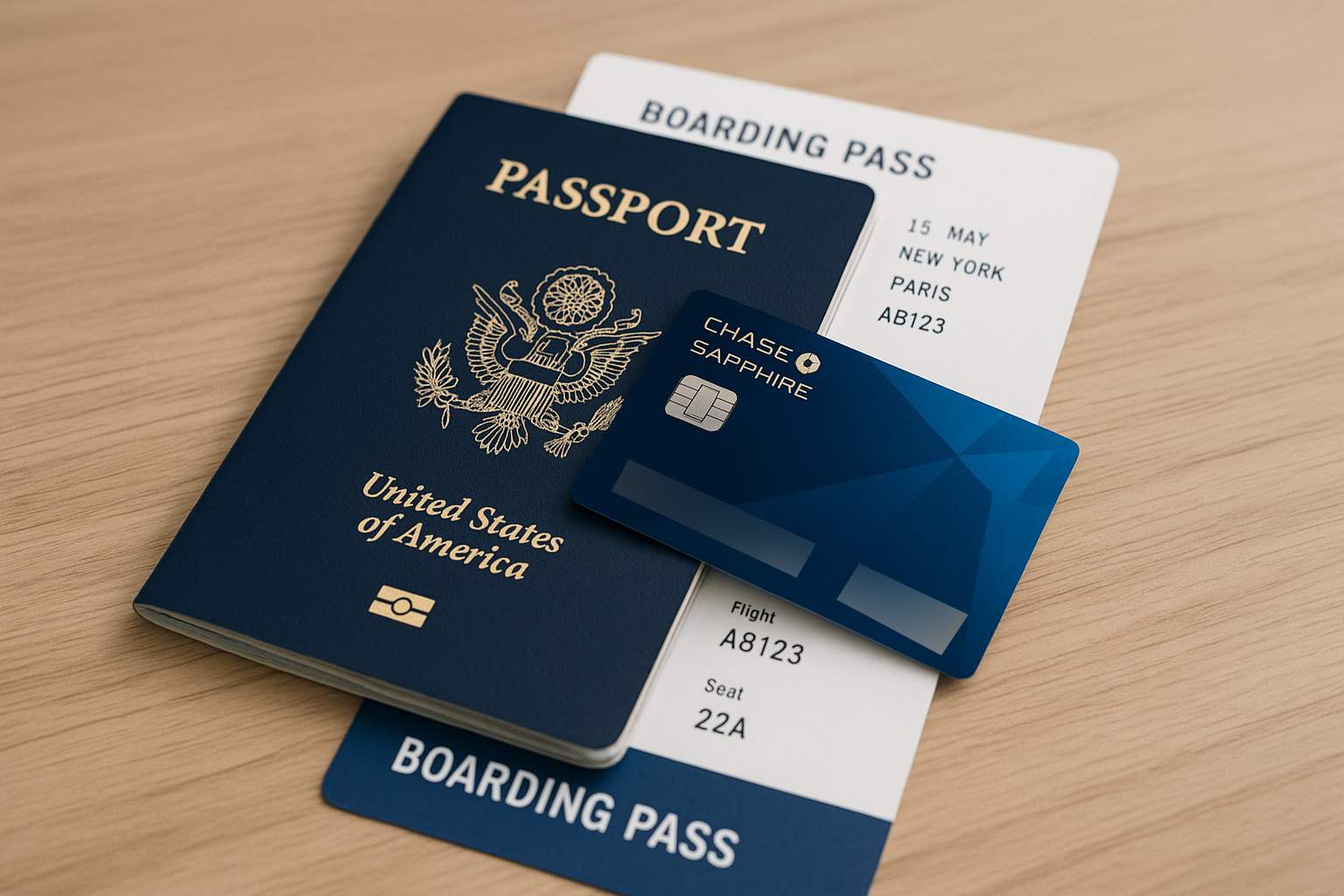
Sapphire Reserve
- Airport lounge access via Priority Pass Select
- $300 annual travel credit toward airfare, hotels, and other travel
- Global Entry or TSA PreCheck fee reimbursement every 4 years
- 50% more value on points when booking through Chase Travel
Chase Business Credit Cards
These are built for entrepreneurs and business owners who want to earn rewards on essential business expenses like advertising, shipping, and utilities.
Ink Business Unlimited
- $750 bonus cash after spending $6,000 in the first 3 months
- Unlimited 1.5% cash back on all business purchases
- No annual fee, great for startups and freelancers
Ink Business Preferred
- 100,000 bonus points after spending $8,000 in the first 3 months
- Bonus categories include such as advertising, travel, shipping, and internet services
- Free employee cards with individual spend limits and tracking
- Points worth $1,250 in travel through Chase Travel
Interested in turning rewards into long-term gains? Use investing services to convert points into cash or apply bonuses toward a J.P. Morgan investment account.
FAQs about Chase Credit Card
Still have questions? Here are some of the most common inquiries about Chase Credit Cards, with straightforward answers to help guide your decision.
How do I redeem Chase Ultimate Rewards?
- Log in to your Chase account, go to “Rewards,” and select cash back, travel bookings, gift cards, or Apple products.
Can I hold more than one Chase card?
- Yes, you can. But if you’ve opened more than five cards from any issuer in the past 24 months, approval may be affected.
What credit score do I need?
- Usually 700+ for premium cards, but some beginner cards work with 600+.
Are Chase cards good for international travel?
- Yes, especially Sapphire cards, which have no foreign transaction fees and come with travel insurance and concierge services.
Q5: Can I upgrade or downgrade a card later?
- Contact Chase customer service to explore product changes, often without a hard credit pull.
Want to manage your finances in one place? Open a Chase business checking account to sync your spending and rewards.
Whether you’re a student, traveler, entrepreneur, or everyday spender, there’s a Chase Credit Card for you. With transparent terms, powerful rewards, robust security, and unmatched flexibility, Chase remains a leader in the credit card landscape in 2025.
